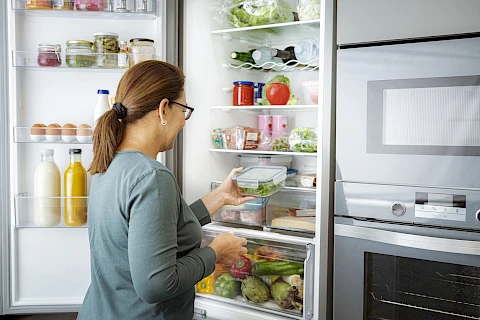
Proper food storage is crucial for maintaining the health and safety of seniors. As caregivers, we need to know how to store food correctly to prevent illness and ensure seniors meet their nutritional needs. Senior Helpers Oakville and Burlington will cover essential tips on storing various types of food, organizing the refrigerator and pantry, and reducing food waste to avoid foodborne illnesses.
Optimal Storage Conditions
Distinguishing between perishable and non-perishable foods is an essential aspect of food storage for seniors. Perishable foods, such as meats and dairy, need to be kept cold to prevent spoilage. Non-perishable foods, such as canned goods, have a longer shelf life and can be stored at room temperature.
For the refrigerator, the ideal temperature is below 40°F (4°C), while freezers should be set at 0°F (-18°C) to preserve food quality and prevent spoilage. Storing food in specific ways can help seniors with dietary restrictions or health conditions. Consulting with a healthcare provider can help ensure they meet these needs.
Organizing the Refrigerator for Safety
Proper food storage for seniors, such as keeping a well-organized refrigerator, can help prevent foodborne illnesses. To avoid cross-contamination:
- Store raw meats on the bottom shelf to prevent juices from dripping onto other foods.
- Label and date leftovers to track their freshness and consume them within 3-4 days.
- Place frequently used items on shelves that are easily accessible to seniors, reducing the need for reaching or bending.
Pantry Organization and Safety Tips
Organizing a pantry is another essential aspect of food storage for seniors, promoting safety and efficiency. Store dry goods, such as pasta and rice, in airtight containers to protect them from pests.
Be mindful of expiration dates and check labels regularly, discarding expired or spoiled food promptly. Arrange items with the nearest expiration dates at the front of the shelf for easy access. To maintain a clutter-free environment, routinely clean the pantry to prevent the accumulation of dust and debris.
Reducing Food Waste
Reducing food waste starts with thoughtful meal planning. Planning meals reduces extra food that could spoil. Get creative with leftover ingredients by using vegetables for soups or stews, or transforming stale bread into croutons. Proper portioning is essential as well. By preparing only the amount needed, we ensure less food goes to waste.
Connection Between Food Storage and Senior Health
Correct food storage is vital in preventing foodborne illnesses, which can be particularly dangerous for seniors. However, proper nutrition helps to maintain a senior's health. By storing food correctly, caregivers can prevent contamination and ensure seniors get the necessary dietary support.
Encouraging seniors to participate in food storage practices can empower them and promote independence. Simple tasks such as labeling containers or organizing pantry shelves can be both engaging and beneficial.
Senior Helpers Can Assist With Safe Meal Planning and Prep
Proper food storage is a key factor in ensuring the health and safety of seniors. By understanding optimal storage conditions, organizing the refrigerator and pantry, and minimizing food waste, caregivers can greatly support the well-being of those they care for.
Contact us at Senior Helpers Oakville and Burlington for personalized caregiving services tailored to the needs of your loved ones in Burlington, Bronte Village, Hamilton, Mississauga, and Morrison. Let's implement these best practices to ensure the safety and health of seniors.